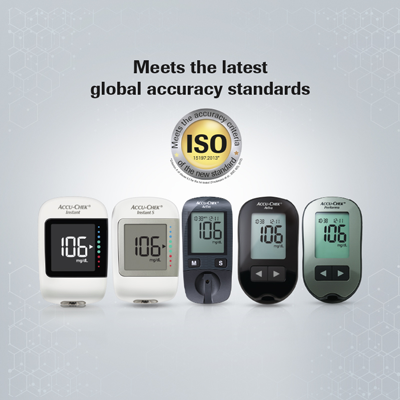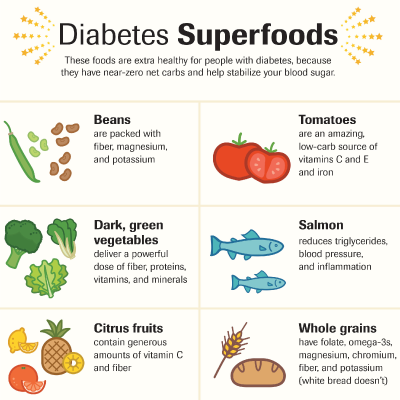Stay healthy during COVID-19
Learn more about the safety measures by International Diabetes Federation (IDF) and World Health Organisation (WHO) against COVID-19 for people living with diabetes.
Read MoreMatching all aspects of the ISO 15197:2013 performance requirements for blood glucose monitoring systems
Accu-Chek brand of blood glucose monitoring products are compliant with the revised standards of IS/ISO 15197:2013 announced by Central Drugs Standards Control Organisation (CDSCO), Directorate General of Health Services, Ministry of Health & Family Welfare. What is ISO? ISO is the International Organization for Standardization headquartered in Switzerland, whose membership is comprised of national standards bodies from approximately 162 countries. ISO is an independent non-governmental organization. What is an ISO standard? An ISO standard is...
Read MoreEating Healthy with Diabetes
You don’t have to sacrifice your target blood sugar levels to enjoy some of your favorite foods. Here’s how to eat healthy with #diabetes, whether you’re cooking at home, or eating in a restaurant. Carbohydrates and your blood sugar Carbohydrates are sugars. They break down in the body creating glucose, a main source of energy. Counting the carbs you eat at every meal and pairing them with the correct dosage of insulin can keep your blood sugar level closer to normal range.1 It also allows you to eat a wider variety of foods. In fact, your diet can accommodate any food in...
Read MoreTransitions: From Orals to Insulin
Insulin and type 2 diabetes: 5 facts you should know Has your healthcare provider talked to you about insulin? For many people, this can bring on mixed feelings and questions—often based on myths that simply are not true. Here are 5 facts to keep in mind. Diabetes is an insulin problem, not a sugar problem. After all, sugar doesn't cause diabetes. People with type 2 diabetes don't manufacture enough insulin, or their bodies can't use it properly, so they're unable to process the food they take in.1...
Read MoreHow to Talk to Your Doctor
How to Talk to Your Doctor Whether you’ve been living with diabetes for years or you’re newly diagnosed, communicating with your healthcare team is one of the best things you can do. If you’re nervous about opening up to your doctor or pharmacist, there are some good reasons to conquer these fears. Less communication leads to measurable increases in your stress, anxiety, and possible depression. It also leads, inevitably, to less frequent and less successful diabetes management.1 Since communicating with your healthcare providers is proven to be good for your health, here are some...
Read MorePreparing for Pregnancy
Preparing for pregnancy—good reasons to start today Let's think into the future. Imagine sitting in a rocking chair playing with ten brand-new, tiny toes. That's the image you can remember every time you check your blood glucose, visit your doctor or say no to a glass of wine. And it's absolutely worth it. Not ready for parenthood yet? Here's what you can do now. There are several things you can do to prepare for pregnancy well before you're ready to conceive. Read about it—just not too much. When you understand the risks, you can take steps to reduce them...
Read MoreMatching all aspects of the ISO 15197:2013 performance requirements for blood glucose monitoring systems
Accu-Chek brand of blood glucose monitoring products are compliant with the revised standards of IS/ISO 15197:2013 announced by Central Drugs Standards Control Organisation (CDSCO), Directorate General of Health Services, Ministry of Health & Family Welfare. What is ISO? ISO is the International Organization for Standardization headquartered in Switzerland, whose membership is comprised of national standards bodies from approximately 162 countries. ISO is an independent non-governmental organization. What is an ISO standard? An ISO standard is...
Read MoreEating Healthy with Diabetes
You don’t have to sacrifice your target blood sugar levels to enjoy some of your favorite foods. Here’s how to eat healthy with #diabetes, whether you’re cooking at home, or eating in a restaurant. Carbohydrates and your blood sugar Carbohydrates are sugars. They break down in the body creating glucose, a main source of energy. Counting the carbs you eat at every meal and pairing them with the correct dosage of insulin can keep your blood sugar level closer to normal range.1 It also allows you to eat a wider variety of foods. In fact, your diet can accommodate any food in...
Read MoreTransitions: From Orals to Insulin
Insulin and type 2 diabetes: 5 facts you should know Has your healthcare provider talked to you about insulin? For many people, this can bring on mixed feelings and questions—often based on myths that simply are not true. Here are 5 facts to keep in mind. Diabetes is an insulin problem, not a sugar problem. After all, sugar doesn't cause diabetes. People with type 2 diabetes don't manufacture enough insulin, or their bodies can't use it properly, so they're unable to process the food they take in.1...
Read MoreHow to Talk to Your Doctor
How to Talk to Your Doctor Whether you’ve been living with diabetes for years or you’re newly diagnosed, communicating with your healthcare team is one of the best things you can do. If you’re nervous about opening up to your doctor or pharmacist, there are some good reasons to conquer these fears. Less communication leads to measurable increases in your stress, anxiety, and possible depression. It also leads, inevitably, to less frequent and less successful diabetes management.1 Since communicating with your healthcare providers is proven to be good for your health, here are some...
Read MorePreparing for Pregnancy
Preparing for pregnancy—good reasons to start today Let's think into the future. Imagine sitting in a rocking chair playing with ten brand-new, tiny toes. That's the image you can remember every time you check your blood glucose, visit your doctor or say no to a glass of wine. And it's absolutely worth it. Not ready for parenthood yet? Here's what you can do now. There are several things you can do to prepare for pregnancy well before you're ready to conceive. Read about it—just not too much. When you understand the risks, you can take steps to reduce them...
Read More






